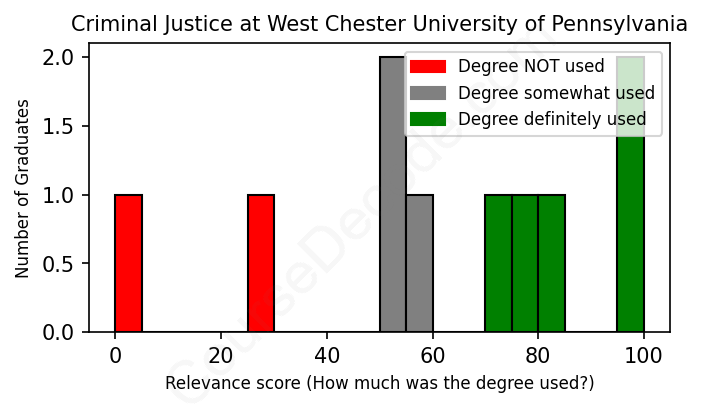
First, some facts. Of the Criminal Justice graduates from West Chester University of Pennsylvania we've analyzed , here's how many have used (or NOT used) their degree in their career:

These are estimates based on AI analysis of 10 LinkedIn profiles (see below).
The verdict? Below average. Overall, with an average relevance score of 60%, Criminal Justice graduates from West Chester University of Pennsylvania have a lower likelihood (-7%) of finding work in this field compared to the average graduate across all fields:
And for comparison, here's the chart for all profiles we've looked at across all degrees.
Also, after graduating, 40% of these graduates have pursued further education other than another Bachelor's degree (such as a Masters degree or other), compared to the average across all profiles of 35%. This suggests you may need more than just a Bachelors degree to be competitive as a Criminal Justice graduate.
See the details:
|
Relevance score: 56% We think this person has gone into a career only somewhat relevant to their degree. We think this person has gone into a career only somewhat relevant to their degree.
DEGREE INFOGraduated in 2010 from West Chester University of Pennsylvania with a Bachelor of Science (B.S.) in Criminal Justice. No other secondary education since. JOB HISTORY SINCE GRADUATIONExecutive Team Leader- Assets Protection Target Jan 2013 - Aug 2014 Site Director- Out of School Time  Catholic Social Services Mar 2016 - 2021 Administrative Assistant  Catholic Social Services 2021 - Present ABOUTNo information provided. |
The top 10 most common jobs done by the graduates we've analyzed (ranked most common to least) are:
After looking through the jobs that folks from West Chester University of Pennsylvania have gotten with a Criminal Justice degree, it’s clear there’s a mix of positions—some closely tied to the field, and others not so much. The most common roles seem to be in investigations, corrections, and various support roles in social services. Positions such as Investigator at the Chester County Public Defenders and the D.C. Office of Police Complaints stand out because they directly apply the skills and knowledge from criminal justice studies. Likewise, roles like Facility Program Manager at the Delaware Department of Correction and Treatment Specialist at the DSCYF make really good use of a criminal justice background, dealing directly with the justice system and working with youth offenders.
However, many graduates are also landing jobs that aren’t really relevant to criminal justice at all. Positions such as Administrative Assistant, Server, or various project management roles show a distinct lack of connection to criminal justice principles—those seem to be more about general skills like organization and customer service than actual law enforcement or legal knowledge. While there are definitely a good number of relevant roles people are stepping into, it’s a bit of a mixed bag overall, demonstrating that a Criminal Justice degree can lead to both focused careers in the field and general jobs where the connection to criminal justice is pretty thin.
Here is a visual representation of the most common words in job titles for Criminal Justice graduates (this is across all Criminal Justice graduates we've analyzed, not just those who went to West Chester University of Pennsylvania):

From what I've seen in this analysis of graduates from West Chester University's Criminal Justice program, it looks like their career trajectories vary quite a bit, especially in the early years after graduation. Many seem to land jobs that are somewhat related to criminal justice right after college, like roles in asset protection, federal business support, or as investigators. However, there's also a noticeable trend of some graduates working in positions that seem less connected to their degree, such as server roles, sales, or administrative jobs. This suggests that while certain individuals may find their footing in criminal justice early on, others might take different paths, especially in their first few jobs after graduating.
As time goes on, particularly five to ten years after graduation, we see a bit more stability in career choices aligning with their degrees. Some graduates have moved into significant roles within correctional systems or law enforcement, while others find themselves in project management positions related to health or research, which, although not traditional for criminal justice majors, still show a level of responsibility. Overall, it looks like many graduates do find solid careers that stem from their education, but there's also a chunk of them who might not stick strictly to criminal justice roles or drift into other industries altogether. It’s a mixed bag, and it really highlights how versatile a degree in Criminal Justice can be, even if that means straying a bit from the initial path.
Getting a Bachelor’s degree in Criminal Justice at West Chester University or really anywhere isn’t super easy, but it’s also not the hardest out there. You’ll be diving into a mix of subjects like law, sociology, and psychology, which can be pretty interesting but also requires some serious reading and analytical skills. Most students find the coursework manageable, but if you’re not into writing papers or studying case law, it might feel a bit more challenging. Overall, it’s definitely doable, especially if you stay organized and ask for help when you need it. So, if you're passionate about the subject, it can be a rewarding experience!
Most commonly, in the LinkedIn profiles we've looked at, it takes people 4 years to finish a Bachelor degree in Criminal Justice.
Looking at the job paths of these Criminal Justice graduates from West Chester University, it seems like they’ve had a mixed bag in terms of earning potential. The earlier graduates, like the one from 2010, appear to be in lower-paying administrative roles and social services, which typically don’t pay much, especially early on in their careers. Meanwhile, the 2015 and later graduates have a range of positions that seem to offer better opportunities, especially in corrections and project management, suggesting they might be earning decent money as they gain experience. However, roles like "Server" or "Keyholder" don’t scream high income either, showing that not everyone is hitting the jackpot right away. Overall, while some are likely doing well, others are still working their way up the financial ladder.
Here is a visual representation of the most common words seen in the "about" section of LinkedIn profiles who have a Bachelor degree in Criminal Justice (this is across all Criminal Justice graduates we've analyzed, not just those who went to West Chester University of Pennsylvania). This may or may not be useful:

Here are all colleges offering a Bachelor degree in Criminal Justice (ordered by the average relevance score of their Criminal Justice graduates, best to worst) where we have analyzed at least 10 of their graduates: